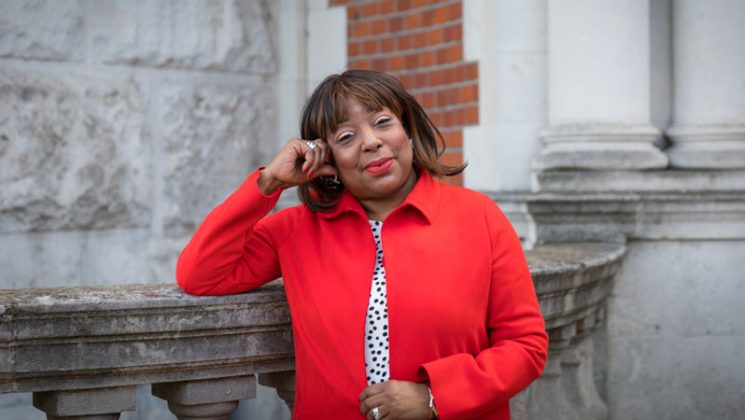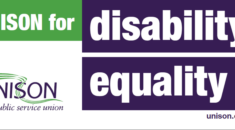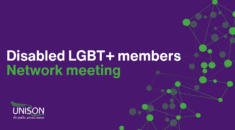©Ralph Hodgson
“I eat, sleep and breathe equalities,” jokes regional convenor and recent winner of UNISON’s Nelson Mandela award, Yvonne Green.
“I just try to support people the best I can. Black, white, women, men, LGBT, disabled, religious or not, so many people face barriers. If someone’s been treated badly or unfairly, I will use all of the tools to get justice for them.”
She was born in Camberwell, south London, to parents who moved from the Caribbean, her mother a nurse and father a labourer. As one of six growing up in the 1960s, her childhood home was one in which children were to be seen and not heard. “It was all about respect. We called everyone Auntie or Uncle,” she recalls.
“But we felt quite protected by our parents. Sometimes we would hear them talking to their friends about racism, y’know – ‘no Blacks, no Irish, no Dogs’, that kind of thing. Or sometimes they would struggle to pay the rent because we were living in shared accommodation and had to pay more than their white counterparts.
“They always wanted the best for us, they encouraged us to be strong and to do the right thing. They were people of faith, as I am, and the church was very much a part of our lives.
“I wanted to be a fashion designer, but in those days your parents chose your profession. One of my sisters got hairdressing, one got nursing and I got secretarial college!”
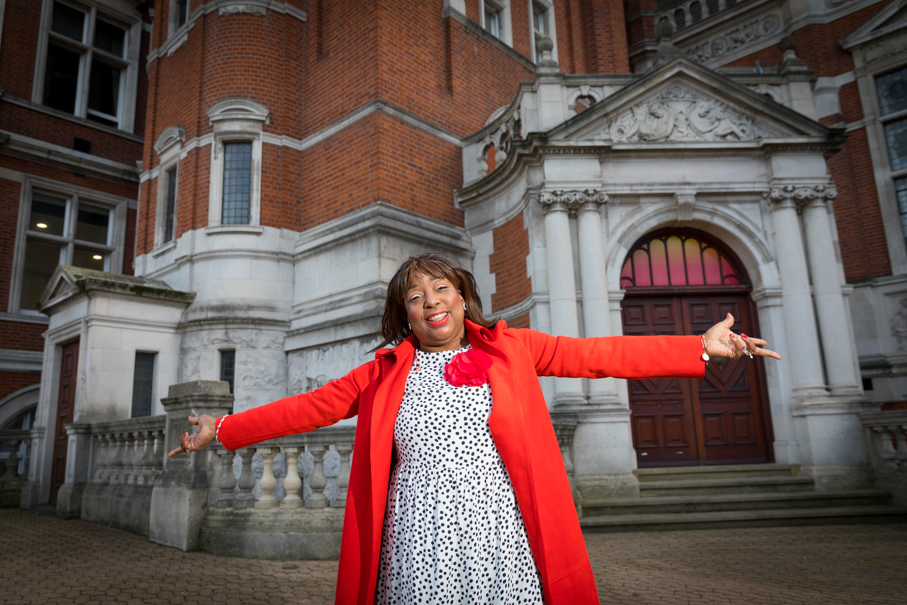
She joined Croydon Council as a receptionist 30 years ago, to be closer to home and her young son, progressing to office manager for social services (where she was commended for the “military fashion” in which the office was run) and up to business support manager.
“I joined UNISON just as it was starting, the early ‘90s, but it wasn’t until about 15 years ago that I really got involved and I haven’t looked back since.”
Heralded as a pioneer in the union, Yvonne was the first Black person to be branch secretary at Croydon – she’s currently seconded full-time in the role, while also serving as convenor for UNISON’s Greater London region. She has spearheaded her branch’s ongoing campaign to pressure the council over its relative lack of diversity in recruitment to high-level positions.
“It’s changed drastically since I started. The workforce is much more multicultural and diverse. But it still doesn’t fully represent the community it serves,” she says.
“We have fortnightly meetings with the employer, and larger meetings four times a year with cross-party councillors present, and we regularly raise equality issues at these meetings.”
Having started from basic steps – such as taking ethnicity questions off application forms – the branch’s work has contributed to the council having two Black and a number of female directors and executive directors. Councillors were close to agreeing the presence of trade union officials as panel members for director-level positions before COVID-19 raised its head.
Equalities are at the heart of almost everything UNISON does and I’m so proud of that
“Becoming a trade union official felt like my destiny to some degree,” Yvonne reflects. “My brother calls my two sisters and me ‘the Sisters of Mercy’ because we’re always the ones wanting to help in the family.”
Her brother knows her well. It becomes increasingly clear during our conversation that Yvonne’s passion for equalities is rooted in an enormous capacity for compassion. We talk about the recent tragic deaths of migrants crossing the Channel and the reasons that drove them to take such risks. She sheds a tear at the thought of the coming winter months, the second wave and the severe effects it will likely have on the homeless and most vulnerable in our society.
Outside of her workplace focus, Yvonne effuses about topics like the need for more disabled representation in films and on TV, more Black football managers and more female leaders in business and politics.
“Of course, trade unions, rightly, still have their core values in workers’ rights, but it’s so closely tied to issues of equalities,” she says. “I think UNISON is the best union at doing that. Equalities are at the heart of almost everything UNISON does and I’m so proud of that.”
Change is coming, but it’s very slow. Education and talking are so important
At the start of this year, her tireless efforts were highlighted when she was presented with the Nelson Mandela Award at the Black members’ conference. The award is presented to someone who has supported, and gone above and beyond to represent Black members, celebrating their achievements, courage and determination within the union and more widely in our society.
“I’m delighted, humbled and proud to have received it,” she says, naming Mandela himself as one of her inspirations, alongside Marcus Garvey, Martin Luther King, Maya Angelou and Barack Obama.
“Do you feel like an inspiration to others now?” I ask.
“There have been a few times where I’ve had feedback from people who say that they look up to me, and it’s obviously nice, but at the same time I don’t do it for that. It’s an honour and a privilege that people might consider me an inspiration, but I don’t think many people do things just to be an inspiration. You do what you do because you’re passionate about it.
“I saw Andy Burnham in the news recently and heard people say he was just grandstanding. At the end of the day he was fighting for his community and wanted the best for his people. I salute him and I’d like to think I’d do the same thing in his position.
“And Marcus Rashford. Gosh, now he’s a real inspiration. They thought the MBE might shut him up! Coming from a humble background like he has, he’s shown them up big time. Boris Johnson’s stance on free school meals is embarrassing. We’re talking about children going without food. It’s a disgrace, I don’t care which party you belong to.”
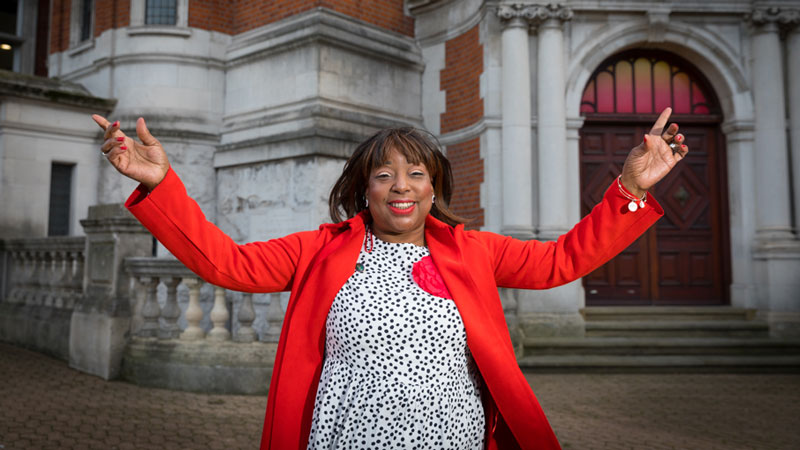
We talk for some time about what progress looks like in a year such as 2020, which has featured the death of George Floyd, the rise of the Black Lives Matter movement and COVID-19.
“Change is coming, but it’s very slow. Education and talking are so important. Look at someone like Prince Harry. His mother-in-law looks like me. Being married to Meghan has made him realise about unconscious bias. It can’t be easy for him to talk about that, but it’s about learning and sharing, and he’s changed people’s attitudes.”
As we’re speaking in Black History Month, we touch on the recent controversy around the statues of slave owners. “I can understand the frustration of people who think these statues are one-sided representations of history, but I don’t agree with destroying those elements of history,” she says. “Have the statue, have a plaque of what the statue represents, and also a plaque about the history of Black people associated with it.
“This stuff has to start from education, in schools, on the curriculum. Talking about issues like this is so important. There are times you’re going to talk to someone you disagree with and even dislike – but it’s about pushing forward for what’s right for the world and saying, ‘I will work with you for the common good’. A lot of the time you realise you’re not far apart.”
As we’re about to end our conversation, she adds one more thing.
“There’s a quote I want to share with you before you go. It goes, ‘Progress is impossible without change, and those who cannot change their minds cannot change anything.’ I think it was George Bernard Shaw.”
It was. And by that logic, you would say Yvonne Green has become quite good at changing her mind.

